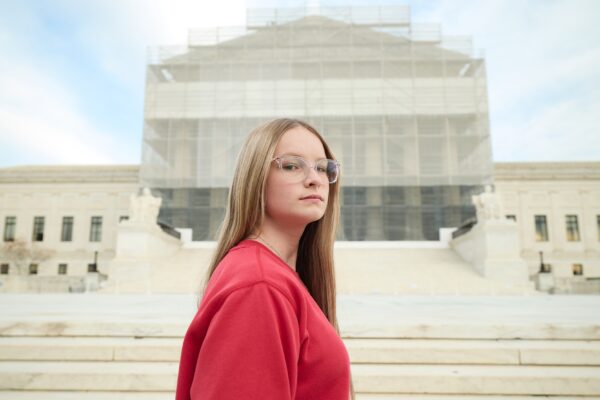Supreme Court Concludes Oral Arguments in Historic Transgender Rights Hearing
WASHINGTON – The U.S. Supreme Court today held oral arguments in two landmark cases challenging state laws banning transgender youth from participating in interscholastic and intercollegiate sports. Lambda Legal, the American Civil Liberties Union (ACLU), and Legal Voice filed two challenges, West Virginia v. BPJ and Little v. Hecox, on behalf of two transgender female athletes – one in West Virginia and one in Idaho – who were categorically barred by West Virginia and Idaho state law from participating on the girls’ and women’s sports teams at their schools.
Attorneys for the two transgender athletes argued today that the bans violate the rights of transgender and cisgender female students under the Equal Protection Clause of the Fourteenth Amendment of the U.S. Constitution. In addition, in West Virginia v. B.P.J. they argued that West Virginia’s ban violates Title IX, the federal law prohibiting sex discrimination in educational programs. Federal courts have blocked enforcement of these bans in both lawsuits.
“Becky simply wants to be with her teammates on the track and field team, to experience the camaraderie and many documented benefits of participating in team sports,” said Sasha Buchert, Counsel, Nonbinary & Transgender Rights Project Director, Lambda Legal. “It has been amply proven that participating in team sports equips youth with a myriad of skills – in leadership, teamwork, confidence, health. On the other hand, denying a student the ability to participate is not only discriminatory, but harmful to a student’s self-esteem, sending a message that they are not good enough and deserve to be excluded. That is the argument we made today and that we hope resonated with the justices of the Supreme Court”.
“This case is about the ability of transgender youth like Becky to participate in our schools and communities,” said Joshua Block, Senior Counsel for the ACLU’s LGBTQ & HIV Project. “School athletics are fundamentally educational programs, but West Virginia’s law completely excluded Becky from her school’s entire athletic program even when there is no connection to alleged concerns about fairness or safety. As the lower court recognized, forcing Becky to either give up sports or play on the boys’ team–in contradiction of who she is at school, at home, and across her life–is really no choice at all. We are glad to stand with her and her family to defend her rights, and the rights of every young person, to be included as a member of their school community, at the Supreme Court.”
Since 2020, 27 states have banned transgender youth from playing school sports. Many of these bans allow for invasive forms of sex testing that put all female student-athletes at risk and embolden intrusive challenges to student-athletes' sex.
“I play for my school for the same reason other kids on my track team do–to make friends, have fun, and challenge myself through practice and teamwork,” said 15-year-old Becky Pepper-Jackson of Bridgeport, West Virginia. “And all I’ve ever wanted was the same opportunities as my peers. But in 2021, politicians in my state passed a law banning me–the only transgender student athlete in the entire state–from playing as who I really am. This is unfair to me and every transgender kid who just wants the freedom to be themselves.
“After West Virginia banned Becky from participating on the girls’ team, our family decided to bring this case for a very simple reason: We want Becky to have the same freedoms and opportunities as her peers,” said Heather Jackson, mom of Becky Pepper-Jackson. “It’s hard enough to be a kid, but I have watched as politicians in my state and across the country have targeted young people like Becky. She is not trying to get a leg up on anyone or demand special treatment. She wants and deserves the same opportunities as any other girl in her school, and we think any loving parent would fight for the same for their family.”
While the justices heard arguments inside the court, outside of the court, hundreds of rally goers traveling from across the country gathered in support of the plaintiffs and the importance of equal access to interscholastic and intercollegiate sports teams, which provide teammates many benefits beyond sports itself. The Fight for the T in Team rally featured a range of speakers, including transgender youth, transgender and cisgender athletes, supportive parents, organizers, civil rights leaders, faith leaders, performers, members of Congress, and more. Photography from the event will be made available for public use shortly.
In Florida, a 15-year-old junior varsity volleyball player was the subject of a police investigation after an anonymous accusation, prompting local officials to draft a 500-page report investigating her medical history, body weight, and anatomy. In Utah, a teenage basketball player was accused of being transgender by a member of the state board of education, leading to threats of violence against her and her family, and a teenager in Maine faced a similar attack from a state senator.
In May, President Donald Trump similarly targeted a 16-year-old transgender girl for participating in a high school track meet. Under an Arizona ban, a cisgender male student was prohibited from participating on the boys’ team at his high school because of a clerical error that listed him as female on his original birth certificate.
Many women athletes have spoken out against bullying and discrimination against transgender student-athletes, including Billie Jean King, Megan Rapinoe, Dawn Staley, Sue Bird, and Brianna Turner, as well as leading organizations fighting for gender equality in athletics, including the Women’s Sports Foundation, the Women’s National Basketball Player’s Association, and the National Women’s Law Center.
A decision is expected in the two cases in the spring or early summer of 2026.
Click here for more information about West Virginia v. BPJ and Little v. Hecox.
Court Case: West Virginia v. B.P.J.
Affiliate: West Virginia


